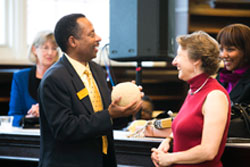The pickup basketball disciples who meet at the Woodruff P.E. Center are an eclectic bunch — English professors and electricians, physicians and groundskeepers, sociologists and whoever shows up. It's that kind of gathering, that kind of game.
It's called the Noontime Basketball Association — Emory's own NBA — and not long after Provost Earl Lewis arrived on campus eight years ago, he could be found pounding the hardwood alongside the regulars, a style of building community and bypassing institutional boundaries that he favors.
"Out there, he's not the provost, he's Earl," said Benjamin Reiss, an English professor who's played alongside Lewis for the past six years and praises the connections that the experience has nurtured both on and off the court.
He knows, too, the provost's secret weapon: a strong outside shot.
Not only does his skill keep the game lively, it requires what hoopsters call "total court vision" — the ability to look down the court, know where people are and anticipate where they're headed, Reiss said.
For the past eight years, that's a talent that has served Lewis well in his role as provost and executive vice president for academic affairs — the ability to peer ahead, identifying issues that will impact higher education, and rather than simply react, take steps to get out ahead of them.
This month, as he prepares to leave Emory for a new position as president of The Andrew W. Mellon Foundation, Lewis is praised by colleagues for his performance as a visionary administrator, generous mentor, and dynamic educator who made a lasting impact as the University's chief academic officer.
Legacy of achievements

Provost Earl Lewis and his wife, Susan, share a laugh over the gift of a melon to mark his departure to become the next president of The Andrew W. Mellon Foundation in New York City. Emory Photo/Video.
When Lewis was approached about the provost's position, it wasn't his first encounter with Emory University.
Twice before, he'd been recruited for job possibilities, but in each case the timing wasn't right. When the opening for a provost came along in 2004, he engaged President James W. Wagner in heartfelt conversations about his vision for the University. Lewis liked what he heard.
"I wanted to make sure that Emory's ambitions were not only bold enough, but that the institution was prepared for what I would try to do as a provost," Lewis recalled, sitting in an office stacked with books and half-packed boxes.
"I said, 'If I'm going to come to Emory, then we have to be prepared to stop talking about what we can do and start talking with great confidence about what we have done. I wanted to take the word 'potential' out of the working vocabulary, and Jim rallied to that notion."
News articles at the time described it as "a new era," and his introduction to the University came fast, overseeing the creation of Emory's first formal strategic plan of its kind, a comprehensive, campus-based self-examination that involved broad faculty input, assessments and goal-setting.
Today, Emory is in the eighth year of that plan, which continues to guide the University with strategic themes, framing principles and targeted initiatives, and "laid the foundation for the largest fundraising campaign in Georgia's history," Wagner noted in a letter to the Emory community.
Wagner has also acknowledged Lewis' leadership in:
Overseeing restructuring of Emory's undergraduate admissions programs, resulting in the largest applicant pool in Emory College history;
Library support that guided and grew digital humanities scholarship and literary archives;
Shaping a new leadership cadre by selecting eight out of nine campus deans;
Promoting rigorous standards for excellence in faculty appointments and academic programs;
Guiding the budgeting process, as chair of the Ways and Means Committee, through some of the University's most financially challenging years;
Creating a commission to study the future role of the liberal arts;
Working with other institutions to create a consortium for online education.
"Most gratifying for Emory has been the role Earl has played nationally, giving Emory visibility and, indeed, a leadership position among our peer institutions," Wagner observed.
"But even more gratifying personally has been the partnership and friendship that Earl and I have enjoyed in working together to serve Emory in its journey from excellence to further eminence," he noted.
Lewis brought "creative and fresh thinking" to the challenges of the office, noted Mike Mandl, executive vice president for finance and administration, who considers the provost a "great listener and thoughtful leader."
"Personally and professionally, I doubt there was a better provost/EVP partnership in the country," Mandl added. "While not always agreeing — although we did most of the time — we shared a deep commitment to advancing Emory, and worked together in a context of trust, mutual respect, candor and humor. It made for a wonderful partnership, and I will miss him."
At a public gathering for the provost earlier this fall, Wagner added that beyond Lewis' skill for long-range thinking — about issues ranging from budgets, promotion and tenure, diversity — was an innate talent for framing opportunities and challenges.
"He realizes that the first answer isn't always the best answer, and that we should be thinking from many different perspectives," Wagner said. "And Emory, as a result, is a much better place."
Connection and community
Beyond administrative work, Lewis leaves a legacy in the relationships he forged, credited for his ability to foster a sense of personal connection with faculty and staff, administrators and students.
"He's a sharp, cagey, strategic thinker, but he also has a way of working with you that makes it so clear that he cares about you personally, that he cares about the issues and challenges of Emory," recalled Ozzie Harris, senior vice provost for community and diversity, speaking at a public farewell event.
Lewis created the Office of Community and Diversity — an effort to sustain and develop Emory's ability to value diversity. He leaves Emory as the highest-ranking African American administrator in the University's history.
During his tenure, Lewis believes he helped craft "a new narrative for Emory" — a place where "folks could come and they didn't have to all be the same," where "the best part of community is diversity."
That commitment never faded. Before leaving office, Lewis expects to receive the first installment of a report he requested on issues of class and status from the Committee on Class and Labor, which he helped create.
The desire to dissolve barriers and cultivate conversations outside the office was one reason Lewis enjoyed playing pickup basketball. Six times a year he also hosted dinner parties, with guests from many corners of the University, intended to "break down community so it becomes bite-size."
People have always been Emory's greatest asset, Lewis maintains: "The challenge will be ensuring that we have enough folks in place who feel comfortable to lead from where they sit. I try to remind people, only one person can be provost or president at a time, but everyone can lead."
Senior Vice Provost Claire Sterk, who will serve as acting provost after Lewis leaves, saw that philosophy in action, crediting Lewis as someone who "pushed me to be creative and courageous."
"He provided opportunities for me to grow — at times, he had more confidence in me than I had in myself. It is a humbling experience to work for such a leader," Sterk recalled. "As a mentor, he has shaped my life in ways I did not envision."
Living what he teaches

Notes of support and farewell wishes were collected during a public tribute for Provost Earl Lewis. Emory Photo/Video.
When Lewis arrived at Emory, Associate History Professor Joseph Crespino already knew him as a prominent scholar of African American history, and soon invited him to co-teach a class on racial politics in the 20th century.
"He was wonderful," Crespino recalled. "His schedule was so busy, but I saw him put aside time to talk about history, to meet with graduate students about their research, and serve on dissertation committees."
While at Emory, Lewis served as Asa Griggs Candler Professor of History and African American Studies. And despite the rigors of his office, he routinely made time for students and scholarship.
Emory graduate student Marisela Martinez-Cola first met Lewis in 1993 when she took his African American studies class at the University of Michigan. "My whole world opened up," she said. "Before, I hated history — I never saw people who reminded me of myself and my friends in history books."
Lewis' class was transformative. "As an educator, he made it accessible. As a scholar, he taught me to excavate. It honestly influences my scholarship now," said Martinez-Cola, who is pursuing a PhD in sociology.
"He's helped me navigate the system and given me the best advice: You have to look ahead, see where you want to be, and plan how to get there."
As Lewis leaves Emory to direct the private Mellon Foundation — which supports areas of higher education, the arts, technology and environmental conservation — he realizes "for the first time, I won't have the word 'professor' before or after my name."
Has Emory changed him? Through the job, he's learned three important things: a new kind of patience, lessons in humility, and a daily reminder that as a leader — whether walking across campus, in a meeting or on a basketball court — you're never invisible.
Though Lewis has already started the process of leaving Emory, ties will remain through people and projects. He cares about the institution, still serves on a few dissertation committees, and would very much like to come back to hear final recommendations from the Commission on the Liberal Arts, which he launched earlier this year.
Moving to New York will put Lewis and his wife, Susan, closer to his children: daughter, Suzanne, 26, also lives in Manhattan and his son, Max, 21, is finishing his senior year at Syracuse University.
To Lewis, his departure is not so much a final farewell as it is his next chapter.
"As I look to Emory and its future, there will be choices that have to be made, and there will be disagreement about those choices," he said. "But I see a future that is bright."

